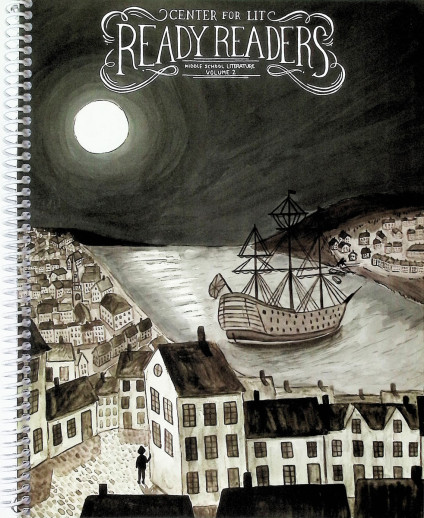We use cookies to make your experience better. To comply with the new e-Privacy directive, we need to ask for your consent to set the cookies. Learn more.
Ready Readers: Middle School Literature, Volume 2
Ready Readers: Middle School Literature provides a full set of Socratic discussion questions for 5 classic junior-high level stories with comprehensive answers keyed to the text. Questions cover Conflict, Plot, Setting, Characters, Theme, Literary Devices, and Context. In addition, a completed Story Chart graphically outlines the major structural and thematic elements of each story.
This resource is appropriate for use with students in grades 6 and up, depending on their needs:
READING COMPREHENSION
Ready Readers: Middle School Literature helps develop good reading comprehension in junior high level students. It encourages them to ponder well-designed questions about structure, style, context, and theme in every story they read.
LITERARY ANALYSIS
The books discussed here were written for junior high and high school students. They provide excellent examples of the structural elements common to all stories. They are therefore useful even in discussions with older students, who read at a higher level, but may be new to the techniques of literary analysis.
Ready Readers: Middle School Literature, Vol. 2 provides complete discussion notes for the following classic stories:
Johnny Tremain by Esther Forbes
Call It Courage by Armstrong Sperry
Tuck Everlasting by Natalie Babbitt
The Chosen by Chaim Potok
The Yearling by Marjorie Kinnan Rawlings
The title sums up this series - twenty-four workbooks, each focusing on a specific skill. This series would be a great reinforcement and test prep for core math content, or serve as extra practice for the student having difficulty. They provide from 24 to 32 pages for each targeted skill and are somewhat like the "Key To" series, but for younger kids. Students will progress from one to three digit addition and subtraction in level C to multi-step word problems in level F. An 8-page answer key provides pretests and post tests so you can gauge your student's progress. These tests are reproducible for classroom or family use. It also provides answers to the pretest, post, test and workbook pages. Manipulatives for suggested use are base-ten blocks, fraction strips, a variety of measuring devices, and centimeter cubes. They also tell you how you can make your own fractions strips and a few ways you can use the tools. You can't go wrong with extra practice at this price. ~ Donna
| Product Format: | Paperback |
|---|---|
| Grades: | 6-8 |
| Brand: | Center for Literary Education |
| ISBN: | 9798987337639 |
| Length in Inches: | 0.125 |
| Width in Inches: | 8.875 |
| Height in Inches: | 0.625 |
| Weight in Pounds: | 0.95 |
Be the first to review this item
The Readers thoroughly provide all the elements needed for a comprehensive and meaningful literature study. I can already hear the question being asked. "If they're so thorough, do I really need to watch the Teaching the Classics video seminar?" I have no doubt that the Andrews would answer with an emphatic "yes!" The Readers are obviously designed to complement the TTC series rather than replace it. While someone picking up a Reader could probably do a passable job of leading a discussion on any particular book, the fullness and richness of that same study conducted by a TTC "graduate" will make that "passable" job seem pale by comparison. So, to summarize the relationship between these products: Teaching the Classics provides the philosophical and methodological foundation. Reading Road Maps provides "framing" for 100 books, while the Ready Readers provide a complete finishing off of a literary "room" for a different series of books. ~ Janice


Price